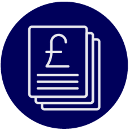14 NOV 2023 15 MIN READ
What are fuel cards for small businesses?
With many businesses now looking for new ways of working, instead of traditional brick and mortar stores, there are a lot more businesses set up at home, online or in a mobile capacity. For these types of businesses company there is a lot more travelling than there has been in the past.
Whether you’re a sole-trader travelling regularly or you’ve got several employees that are on the go constantly, having a fuel card could be a helpful way to reduce or control your business fuel expenses.
What are fuel cards?
Fuel cards are essentially a type of credit or debit card that is only available to business owners and can only be used for specific expenses – usually just fuel but sometimes other car-related expenses as well.
When a fuel card is used, usually the expenses are tracked on one central dashboard that the employer has access to. This makes it easier to claim expenses back from HMRC, reduces the amount of physical receipts needed, and reduces admin because employees don’t need reimbursement for fuel costs if it’s been paid for on the company fuel card.
It also means that employees can fill up without paying VAT at the pump – instead the employer gets one single VAT invoice which again reduces the need for saving every receipt from every fuel transaction.
Understanding fuel cards
There are many different fuel card providers and each will have their own perks, costs and limitations.
If you’re a sole trader, you’ll really want to see if the points or savings that you get from the fuel card is enough to cover the cost of the annual fees that usually come with the card – if they don’t, then a fuel card may not be right for your business just now.
Some cards will also have a minimum spend or a minimum amount of litres you need to buy per month and a penalty fee if you don’t meet the minimum – so if you decide to get a fuel card, you’ll need to be careful about choosing one which either doesn’t have a minimum or has a minimum that you’re reasonably confident you'll meet.
Features to look out for
If you’re thinking about getting a fuel card, it can be overwhelming to sort through all the providers out there. We’ve gathered a few questions you can ask that will help you decide who the right fuel card provider is for you:
Many will be associated with specific supermarket loyalty points such as Nectar or Clubcard, but some programme may help you get rewards at places such as Amazon, Cineworld or even Avios flight points.
While most cards will tell you about the costs and mileage being used, some have additional reporting such as your CO2 output which can be useful if you’re trying to make your business more environmentally friendly. If you have a larger fleet, you may want to look for reporting that can breakdown the fuel consumption organised by driver, vehicle and card.
If you can, it’ll likely still be car related but engine lubricants, car washes, or parking fees can be paid for on some fuel cards as well.
If the card uses a fixed weekly tariff, that can help you forecast costs as it won’t be subject to price fluctuations however if the pump price is lower than the fixed price you won’t be able take advantage of that.
Some cards will only let you use at motorway stations and not inner-city stations, so it’s worth looking for a card that suits the areas you frequent for work. Often the cards are also tied to a specific fuel network, so you’ll want to find one that has good coverage for your needs. If you use the fuel card at a station which is not in your network, there’s usually out of network transaction fees which can really cut into your savings.
Some cards have station finder apps to help ensure you never accidentally use the card out of network which is a nice additional support function. You may also want to check how else they give customer support – whether it’s via telephone, online or through an app.
Make sure that the fuel card works for the type of fuel that your vehicle needs. Petrol or diesel – make sure that you’re able to use it for whatever you need.
Hidden costs to consider
While the fee to join a fuel card programme will be pretty transparent, there can be other hidden costs that you’ll want to find out about before signing up for a card. Not every fuel card will have these fees, but it’s worth thoroughly reading the T&Cs or asking a sales representative about these so that you have a full picture of the cost:

Name change fees

Paper invoice fees

Termination fees

Replacement card fees

Out of network transaction fees

Risk-based fees
You might not need to worry about all of these, but they’re worth asking about just in case!
Fuel card vs credit card
Similar to a credit card, you’ll likely need a credit check done when you buy a fuel card. Once the check is carried out, the card provider will decide how much credit to give you on the fuel card based on criteria such as the duration of credit, your monthly spend and invoice payment intervals.
If you’ve never checked your business credit score before, you may want to do that prior to applying for a fuel card. There are small actions you can take to improve you score and this may increase the limit a fuel card provider is willing to give you.
While you could just use a regular credit card for fuel purchases, they usually won’t get you any discounts on fuel prices or provide you with VAT invoices for your HMRC filing. Since your fuel card is linked to a specific driver or vehicle and can only be used for furl-related purchases, it also creates better security and fraud prevention over the average business credit card.
If you or your employees frequently have business expenses that are not related to fuel, then a business credit card could be more useful as those can be used to make any sort of purchase. However, you’ll need to keep all receipts in order to claim allowable expenses on these if it doesn’t give you invoices like fuel cards do.
Who is eligible for a fuel card?
Any registered company, no matter the size, can apply for a fuel card. Even a registered sole-trader can get them! However, you cannot apply for a fuel card for personal use if you haven’t registered as a company with companies house, you won’t be able to apply for one.
How to get a fuel card?
After researching providers and comparing prices, most providers will allow you to apply for a fuel card online. If you prefer to ask a few questions first, most providers will offer free consultations and help you ensure you’re getting the right card for your business. You may be able to apply on the phone with them once you’re sure of what you want.

Once the full application process is done – including credit checks – you’ll usually get your fuel card within two business weeks.
How do fuel cards work?
A fuel card is very simple to set up and get started using. If you’ve decided you want to get one and are curious about what it’s like, take a look:
-
Set up your fuel card account.
This will enable you to allocate cards to specific driver or vehicles as needed. You’ll also use this account to check any of the reporting features your card offers such as spending habits, fuel usage and VAT invoicing. -
Use your cards.
Even if your company has forecasted sales accurately, customer wants can be fickle. For a multitude of reasons, interest in stock may drop, leading to poor sales and, eventually, dead stock. Quality issue: Even if your company has forecasted sales accurately, customer wants can be fickle. For a multitude of reasons, interest in stock may drop, leading to poor sales and, eventually, dead stock. -
Get your invoices.
With most fuel cards, you’ll get you HMRC compliant invoices through your online account and you’ll be able to use these for business activities such as claiming your allowable expenses at the end of the tax year.
Advantages & disadvantages of fuel cards
After researching providers and comparing prices, most providers will allow you to apply for a fuel card online. If you prefer to ask a few questions first, most providers will offer free consultations and help you ensure you’re getting the right card for your business. You may be able to apply on the phone with them once you’re sure of what you want.
Advantages:
- Can contribute to fuel savings for your business
- Easy online dashboards for admin and management
- HMRC approved VAT invoices delivered electronically
Disadvantages:
- Need to use specific petrol stations or you could face penalty fees
- Has monthly or yearly membership costs
- Could have penalty fees if you don’t meet a minimum usage level
How much tax do you pay for fuel cards?
If employees only use the card for business use, then there should not be any tax implications for them and as a business you can write-off any work related fuel costs against your taxes in the form of allowable expenses.
However, if an employee also uses the card to buy fuel for personal uses then it becomes a taxable benefit. You’ll have to declare this personal usage to HMRC and the business will need to pay national insurance contributions based on the value of the fuel benefit being provided. The employee may also be liable to pay tax on the value of the fuel given for personal use.
If an employee reimburses the company for any personal-use of fuel, then you may be able to avoid this tax bill as it would no longer be a benefit to the employee.
Fuel card FAQs
If you’ve still got a few questions about how fuel cards work, hopefully we cover them in the frequently asked questions below:
This answer will vary depending on how often you drive somewhere that isn’t your main office for work-related purposes. If you do frequently drive around for work, then it absolutely can be worth it! Some of the benefits you might see are cheaper fuel, less time spent on admin and accounting, and a better understanding of your business finances. The fuel card won’t be worth it for every business though, so you should really do a cost-benefit analysis to ensure that the amount you’re saving exceeds what you’re spending to have the fuel card in the first place.
Yes, but the tax reporting for this can get much more complicated as you’ll have to show how much fuel is used for personal use and how much is for business use. You’ll likely have to put the full value of the fuel purchased on the fuel card on your P11D form as fuel is a taxable benefit. You can then claim tax relief on any genuine business mileage only. It may help to keep mileage logs so that you can evidence your calculation of how much is business usage vs personal usage.
Under the current tax rates, you would be able to claim the first 10,000 miles at 45p per mile and any additional mileage over and above this at 25p per mile. Alternatively, there may be flat rates that you could use to calculate your business usage.
As long as you use it at stations which are supported by your fuel card provider, you are likely to see a savings when using a fuel card instead of paying normally. The savings are often anywhere between 2p to 10p per litre of fuel. While this doesn’t sound like much, it can add up quickly for any business that spends a lot of time on the road.
Stay on track with AXA’s van insurance
Don’t let an unexpected bump in the road bring your plans to a standstill. Protection from AXA van insurance will steer you in the right direction so you can continue on the road to success.
All links are checked and valid at time of publishing, 14 November 2023.